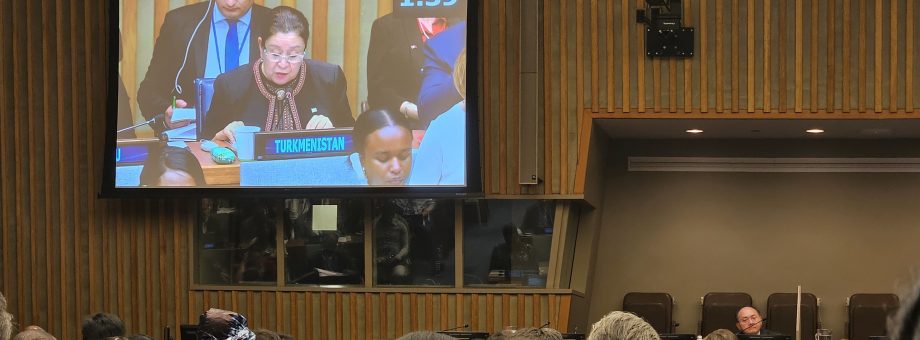STATEMENT by H.E. Mrs. Aksoltan Ataeva, Permanent Representative of Turkmenistan to the United Nations during the introduction of the First Committee draft resolution entitled “Treaty on Nuclear-Weapon-Free Zone in Central Asia”

(1 November 2024)
Madame Chair,
Excellencies, Ladies and gentlemen,
It is my honour on behalf of the delegations of Turkmenistan, Kazakhstan, Kyrgyzstan, Tajikistan, and Uzbekistan to present the draft resolution entitled " Treaty on Nuclear-Weapon-Free Zone in Central Asia," contained in document A/C.1/79/L.5.
We express our deepest appreciation to all delegations for their constructive and fruitful engagement throughout the negotiation process. Their collective efforts have resulted in a comprehensive outcome.
The seed for a nuclear-weapon-free Central Asia was first sown at the 48th session of the General Assembly in 1993. This idea was further cultivated at the 1997 International Conference in Tashkent, where the vision of a nuclear-free Central Asia took shape.
Driven by a shared commitment to global nuclear disarmament, the five Central Asian states signed the Treaty on a Nuclear-Weapon-Free Zone in Central Asia in September 2006 that entered into force in 2009, marking a significant milestone in regional and global nuclear non-proliferation efforts.
It’s important to note that beyond its nuclear disarmament goals, the Treaty also prioritizes cooperation in peaceful nuclear energy utilization and environmental rehabilitation of nuclear test sites.
Let me also list a number of distinct characteristics of the Central Asian Nuclear-Weapon-Free Zone:
First: It is the first nuclear-weapon-free zone established in the Northern Hemisphere.
Second: It is the first time that a nuclear-weapon-free zone has been created in a region having a long border with two states possessing nuclear weapons.
Third: Central Asian zone includes a state which previously possessed nuclear weapons.
Distinguished delegates,
This year we celebrate the Fifteenth Anniversary of the Treaty’s entry into force, and today, Central Asian states are even stronger in their commitment to fulfilling regional nuclear-weapon-free mandate.
As stated in the operative part of the draft resolution, we intend to mark this anniversary in Turkmenistan and convene the Meeting of States parties to the Treaty with a focus on enhancing cooperation between existing nuclear-weapon-free zones.
In this regard, I would like to mention that we already agreed on signing in December the Memorandum of Understanding between the nuclear weapon-free-zone in Central Asia and the OPANAL Agency for the Prohibition of Nuclear Weapons in Latin America and the Caribbean. We call upon other zones to follow this path and consolidate our efforts globally.
Madame Chair,
We invite all nations that value peace, development, and cooperation to join more than 50 countries and co-sponsor the resolution I introduce today.
To conclude, let me emphasize that for the states of Central Asia, the establishment of a zone was a practical necessity, driven by the need to ensure that the people of our region will never suffer the consequences of a nuclear arms race.
Thank you for your attention.


 STATEMENTS
STATEMENTS